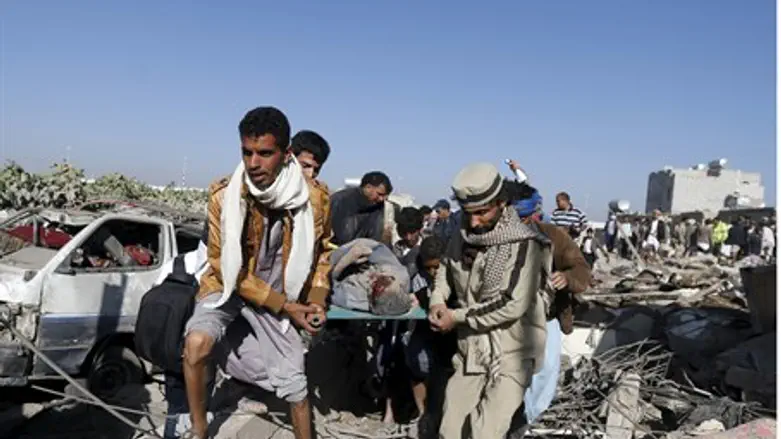
Earlier this morning, Saudi Arabia launched a joint Arab League-Pakistani operation against Houthi rebels in Yemen called Operation Decisive Storm.
The Houthis are Zaydi Shiites, who the Iranian regime has begun to back with weapons and resources in their march across Yemen. This is the third Saudi intervention against the Houthis, but the timing has more regional significance than in the past.
Getting less attention right now is that the United States has also expanded its own airstrikes against ISIS in Tikrit, taking over more of the leadership role some have warned Iran had assumed in Iraq.
As the nuclear negotiations deadline looms and Prime Minister Binyamin Netanyahu has ramped up public pressure on the Obama Administration to be more aggressive with Iran, Arutz Sheva asked Yoel Guzansky of the Institute for National Security Studies if this was likely a coordinated set of simultaneous operations.
"I definitely agree with that assumption," said Guzansky, who noted that it was still an issue for the US because they had to coordinate their own operations with Iraqi forces on the ground (who are also working with the Iranians).
The combined goal seems to be obvious. But the fact Saudi Arabia acted in such an overt manner and so abruptly comes as a surprise to Guzansky.
"This is a surprise because this is a country that tends to use diplomacy and its deep pockets to gain influence. But this isn't the first time they've done this: in 2009 they got involved with the Houthis in the north (of Yemen) and March 2011 they entered Bahrain. They put put their foot down then sending a message to Iran that 'This is it. This is a red line you don't cross.' Now, today they are looking to stop the advance of the Houthis on the ground and send a message to Iran."
Reports of the Saudi military build-up had barely been published when the kingdom launched its assault early this morning. With such a sudden deployment, the goals might be immediate for an operation of limited scope
"We need to ask ourselves what it wants. I think strategically it wants the Houthis back at the negotiating table (with the country's President). They hinted at this. Saudi Ambassador to the United States Adel al-Jubeir who declared the operation said they wish to get the Houthis back there after the Houthis refused to attend the summit the Saudis organized in Riyadh."
Saudi Arabia has invested millions in the government in the fallen regime in Yemen, aid that Reuters reported in December the Saudis had cut off. The major decision now, besides the ominous timing in relation to the nuclear negotiations with Iran, comes as Houthi rebels advance on the port city of Aden at the mouth of the Red Sea.
"I think the fall of the strategic port of Aden, if it falls (and it would have fallen in a matter of hours had it not been for this operation) would have meant that Yemen had fallen. It is the last strategic point in the country."
The President of the country is trying to maintain an image of strength, claiming he is leading the government's resistance in the city and denying rumors that he had fled the country by ship.
When asked if Iran was in a position to respond militarily to the Saudi operation, Guzansky called it "the million dollar question."
"If I had been asked yesterday, I would have said the Saudis were better off only threatening to wage war. I guess they didn't think it helped and they had to do something."
"My guess is Iran would continue to support the militias as they have in the past. Would they give them more support or money? Probably. It is good for them (Iran) to preoccupy the Saudis right in the Saudis' own backyard. It's of interest to Iran."
What should not be lost in this is that had the Houthis moved more slowly, there might not have been such an immense intervention on the part of Saudi Arabia and its allies to roll back Houthi advanced in the country.
"The Iranians might have preferred the Houthis went slower. The same thing happened to ISIS. They rushed in their conquest to control as much land as possible. It was too fast and ultimately counterproductive." The alarm bells that rang as a result created widespread support for intervention.
"It's a coalition of 10 Arab and Pakistani countries. That's not important on the ground but it is symbolically. The Saudis have political and diplomatic backing. They have legitimacy. The entire Arab and Sunni Muslim world is behind them."
So far, there is no expectation the Saudis will use ground forces like they did in 2009 when Houthi forces penetrated 50 kilometers into Saudi Arabia and killed a number of troops. As much as the Saudis might want to absolutely eliminate Iran's asset on the Iranian peninsula, they likely will not have the ability. Right now, Guzansky assumes that the Saudis will want to roll back Houthi gains rather than destroy them.
"They know they cannot really turn back the clock on this. The Houthis are the strongest military force in Yemen."
"So far there are limited goals and limited tools: the air force, some naval forces surrounding Yemen to block reinforcements and of course the strategic goal to get them back to the negotiation table."